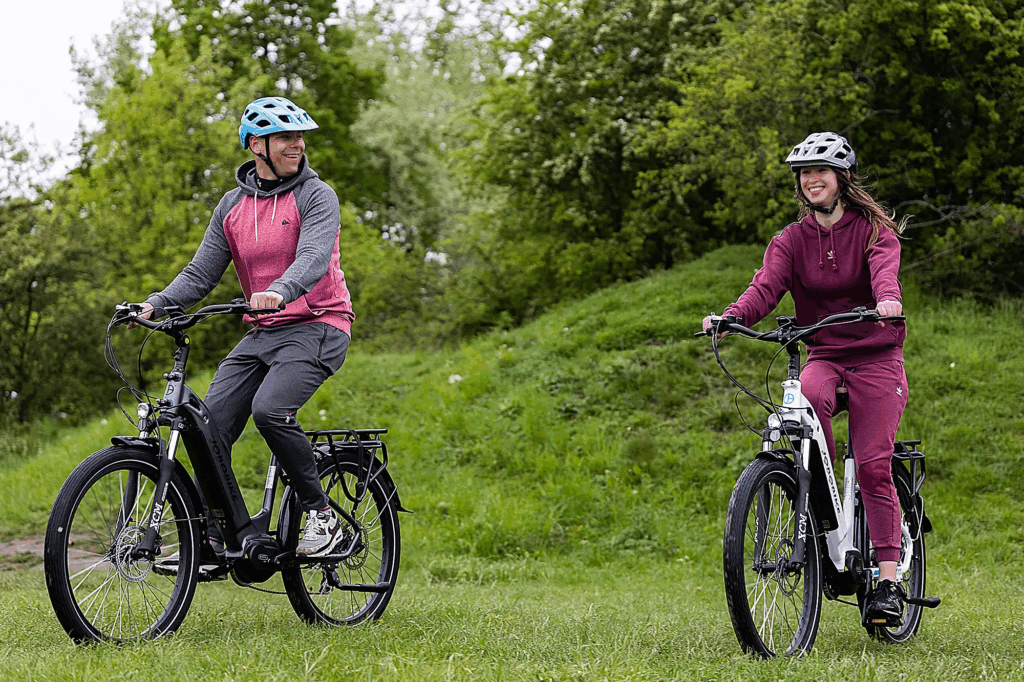Table of Contents
As the world intensifies its fight against climate change, the spotlight on sustainable transportation options has never been brighter. Among these, ebikes stand out as an incredibly eco-friendly alternative to traditional vehicles. Unlike cars and motorcycles that release harmful emissions into the atmosphere, ebikes produce zero tailpipe emissions, making them a cleaner choice for short-distance travel.
On average, they consume significantly lesser energy per kilometer than petrol cars, showcasing a lot of potential to reduce individual transport-related emissions. With their ability to ease traffic congestion and the minimal electricity required for charging, ebikes not only promote sustainable urban mobility but also encourage cities to develop greener infrastructure. In this blog, we will delve into the numerous environmental benefits of ebikes and explore how they can play a vital role in building a more sustainable future.

Zero Emissions: A Breath of Fresh Air
Ebikes represent a significant step forward in promoting environmental sustainability, primarily due to their zero tailpipe emissions. Unlike traditional cars and motorcycles that release harmful pollutants such as carbon dioxide and nitrogen oxides into the atmosphere, ebikes produce none. This not only aids in improving air quality but also contributes to a reduction in overall greenhouse gas emissions.
On average, electric bikes consume 15 to 40 times less energy per kilometer than petrol cars, making them a highly efficient alternative for short-distance trips. In fact, by opting for an ebike, individuals could reduce their transport-related emissions by up to 50%, showcasing a powerful solution for both urban dwellers and eco-conscious commuters alike. In addition to their low emissions, ebikes play a crucial role in alleviating urban traffic congestion. With fewer cars on the road, there’s a decrease in idling vehicles, resulting in fewer emissions released into the environment.
Furthermore, the battery of an electric bike requires minimal electricity for charging—generally under 1 kilowatt-hour—which translates to a small carbon footprint, especially when charged using clean or mixed energy sources. As cities strive to promote sustainable urban mobility, ebikes encourage the development of greener infrastructure like bike lanes, leading to a reduced dependence on fossil fuel-based transport and a quieter, less stressful urban atmosphere. These factors collectively highlight how ebikes are not just an eco-friendly choice, but also a practical one for a cleaner planet.
Energy Efficient: Ebikes vs. Petrol Cars
When comparing ebikes to petrol cars, energy efficiency is one of the most striking advantages of electric bikes. On average, electric bikes utilize way lesser energy per kilometer than traditional petrol vehicles. This significant reduction in energy consumption is crucial in our fight against climate change as it implies that an electric bike can transport a person with minimal energy use, resulting in significantly lower greenhouse gas emissions.
By adopting electric bikes for short-distance trips, individuals could reduce their transport-related emissions drastically, making a measurable impact on the environment and contributing to a greener future. Moreover, the carbon footprint associated with charging an ebike battery is incredibly low, typically requiring lesser electricity. When charged from renewable or mixed energy sources, this further diminishes the environmental impact.
In addition, the manufacturing process of an ebike produces a considerably smaller carbon footprint compared to petrol cars or even electric cars with large batteries. By switching to ebikes, we not only make a conscious choice for a more energy-efficient mode of transportation but also help in reducing the overall demand for fossil fuels, paving the way for a more sustainable urban mobility framework that encourages cleaner alternatives to traditional vehicles.

Cutting Down Transport Emissions: The 50% Reduction Potential
One of the most compelling reasons to consider ebikes as a sustainable transportation option is their impressive potential to cut down transport emissions. Studies indicate that by switching to an ebike for short-distance trips, individuals could reduce their transport-related emissions by up to 50%. This significant decrease stems from the fact that ebikes produce zero tailpipe emissions, unlike conventional cars and motorcycles that contribute harmful pollutants to the atmosphere.
With ebikes using remarkably lesser energy per kilometer than petrol cars, their adoption can substantially reduce individual and collective carbon footprints, making them a crucial ally in combating climate change. Moreover, ebikes not only reduce emissions directly but also alleviate the traffic congestion that contributes to idling vehicles and increased air pollution in urban areas.
As cities embrace electric bikes as a mainstream mode of transport, they also pave the way for greener infrastructure, like dedicated bike lanes, ultimately decreasing overall car dependency. This holistic approach towards urban mobility reinforces the environmental benefits of ebikes, encouraging a shift away from fossil fuel-based transport and minimising the carbon-intensive processes associated with oil extraction and refining. As we strive for a sustainable future, promoting the use of ebikes will be a vital part of the solution to our transportation woes.
Traffic Congestion Relief: A Solution for Urban Areas
Ebikes are proving to be a powerful solution to traffic congestion in urban areas, which significantly contributes to environmental challenges. With their ability to maneuver in narrow spaces and access bike lanes, ebikes reduce the overall number of vehicles on the road. This not only alleviates traffic jams but also curtails the emissions produced by idling vehicles as they navigate through congested streets.
By substituting car trips with electric bikes rides for short distances, we can cut individual transport-related emissions by up to half, promoting cleaner air in our cities. Moreover, the adoption of ebikes fosters the development of integrated transport systems, allowing them to complement public transportation.
As cities enhance their infrastructure to accommodate more cycling options, they create an efficient alternative to traditional fossil fuel-powered cars, simultaneously reducing the noise and pollution associated with urban traffic. In doing so, electric bikes not only improve the efficiency of urban commutes but also lay the groundwork for sustainable urban mobility, encouraging ongoing investments in greener infrastructure for future generations.

Minimal Charging Footprint: Sustainable Energy Use
One of the remarkable aspects of ebikes is their minimal charging footprint. Typically, charging an electric bikes battery requires less than 1 kilowatt-hour of electricity, which translates to a surprisingly low carbon footprint, especially if the power is sourced from clean or mixed energy grids. This makes ebikes a highly efficient option for those concerned about their energy consumption and overall environmental impact.
By promoting the use of electric bikes for daily commutes and short trips, we can significantly reduce our reliance on fossil fuels and promote sustainable energy use in urban settings, allowing for cleaner air and healthier living environments for residents. Moreover, this efficient energy use aligns perfectly with the growing push for greener urban infrastructure.
Cities are now encouraged to develop bike lanes and enhance public transport systems, allowing electric bikes to complement traditional transport modes. This not only reduces the overall dependency on cars but also helps alleviate traffic congestion. Hence, by integrating ebikes into our daily lives, we are taking a vital step towards fostering a more sustainable future, ultimately reshaping our transportation landscape to be cleaner, quieter, and more environmentally friendly.
Smaller Manufacturing Footprint: Comparing Ebikes and Electric Cars
When evaluating the environmental impact of transportation options, the manufacturing footprint is a crucial factor. Ebikes have a significantly smaller manufacturing footprint compared to electric cars, particularly because they are equipped with smaller batteries and require fewer resources to produce. While electric cars involve extensive mining and processing of components for their large batteries, electric bikes contribute to far less environmental strain.
This results in a more sustainable production process, making electric bikes an attractive option for eco-conscious consumers who want to minimize their overall carbon footprint. Moreover, the production and usage patterns of electric bikes promote a greener future. By reducing reliance on fossil fuel-based transport, ebikes encourage a decrease in oil extraction and refining, which are carbon-intensive processes.
Additionally, the low energy consumption of electric bikes during operation—using 15 to 40 times less energy per kilometer than petrol cars—reinforces their appeal as an environmentally friendly alternative. By choosing an ebike, individuals not only enjoy the benefits of efficient travel but also play a significant role in fostering sustainable urban mobility and reducing overall emissions from the transportation sector.

Reducing Oil Dependency: The Fossil Fuel Connection
Ebikes play a crucial role in reducing our dependence on fossil fuels, which are at the heart of many environmental issues today. By adopting electric bikes, individuals can significantly lower the demand for oil extraction and refining, processes that are notorious for their carbon-intensive nature. Unlike petrol cars, which require a constant fuel supply and contribute to greenhouse gas emissions, ebikes operate on electricity, offering a cleaner alternative for short-distance trips.
This transition not only lessens the strain on our planet’s resources but also helps lower the carbon footprint associated with fuel production, making ebikes an essential part of the solution to combat climate change. Moreover, the environmental impact of ebikes extends beyond just oil dependency. By encouraging a shift away from petrol-powered vehicles, electric bikes contribute to a larger culture of sustainable urban mobility.
This shift fosters the development of greener infrastructure, such as bike lanes and pedestrian paths, facilitating a more eco-friendly environment. As cities embrace this change, they also witness a reduction in traffic congestion and air pollution, creating healthier urban spaces for residents. Overall, the integration of electric bikes into daily transportation dramatically encourages a significant reduction in fossil fuel use, promoting a future rooted in sustainability and environmental stewardship.
Enhancing Urban Mobility: Ebikes and Public Transport Integration
Electric bikes play a crucial role in enhancing urban mobility, particularly through the integration with public transport systems. By providing an efficient supplement to buses and trains, electric bikes encourage multimodal transport, promoting a seamless transition for users between various forms of transportation. This synergy not only enhances accessibility but also reduces the number of private vehicle trips on the road.
As a result, cities can witness a significant reduction in traffic congestion, leading to lower emissions from idling vehicles and improving overall air quality. By adopting ebikes as part of their transport solutions, urban planners are taking important steps toward creating a more sustainable city environment. Moreover, the use of ebikes in conjunction with public transport systems contributes to a decrease in fossil fuel dependency, addressing oil extraction and refining’s carbon-intensive processes.
With ebikes charging requiring minimal electricity, often under 1 kilowatt-hour, they offer a small carbon footprint, especially when powered by clean energy sources. As cities develop greener infrastructure, such as dedicated bike lanes, electric bikes are proving to be more than just an alternative mode of transport; they are a catalyst for progressive urban planning aimed at reducing emissions and enhancing residents’ quality of life.
The Future is Green with Ebikes
In conclusion, the environmental advantages of electric bikes are undeniable. By producing zero tailpipe emissions and consuming significantly less energy compared to traditional vehicles, electric bikes present a sustainable alternative for personal transport. As urban centers become more congested, the reduced traffic and lower emissions from idling vehicles contribute to cleaner air and a more enjoyable urban experience.
Making a switch to ebikes not only benefits individual riders but is a critical step toward tackling climate change on a broader scale. Furthermore, the adoption of electric bikes encourages a culture of greener urban mobility, prompting cities to reevaluate their infrastructure and promote bike-friendly initiatives.
With their minimal energy requirements for charging and lower manufacturing footprints, electric bikes serve as a crucial component in the quest for sustainability. It’s clear that embracing ebikes not only enhances personal convenience but also plays an integral role in fostering environmental health and a vibrant, pollution-free future.

This article makes us realize that ebikes can really make a difference in saving our environment, we should encourage more people to switch to ebikes.
Dear Emily, we’re thrilled to hear that our article has made you realize the impact of e-bikes on the environment. Here at Eko Life, we share the same passion for sustainable urban mobility, and we’re committed to promoting the adoption of e-bikes as a viable and eco-friendly alternative. Thank you for sharing your thoughts with us, and we’d love to hear more about your experiences with e-bikes! If you have any questions or would like to know more about our products, please don’t hesitate to contact us at [email protected] or +65 6589 8877.
The writer is absolutely right, ebikes have many advantages, they’re not just eco-friendly, they’re also cost-effective. We need more investment in ebike infrastructure.
We completely agree, Rajan! Ebikes not only help reduce our carbon footprint but also offer a cost-effective mode of transportation. Investing in ebike infrastructure is a great step towards creating a sustainable urban environment. We’re actually working on expanding our ebike fleet and developing more accessible charging stations. Thank you for sharing your thoughts! If you have any suggestions or feedback, please don’t hesitate to reach out to us at [email protected] or +65 6589 8877.
It’s about time we shift our focus towards sustainable living, ebikes are a great step towards it. Integrating them into our public transport system is a must.
Thank you, Lily, for sharing your support for sustainable living! We completely agree that integrating ebikes into our public transport system is a crucial step towards a greener future. We’re actively working with local authorities to develop ebike-friendly infrastructure and encourage more people to adopt eco-friendly transport options. If you have any suggestions or ideas on how we can enhance our e-mobility services, please feel free to reach out to us at [email protected] or +65 6589 8877.